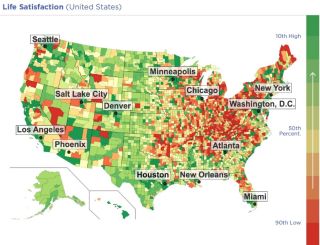Happiness
2023 World Happiness Report: “Happiness Is a Movement”
The knowledge of how to promote happiness is becoming a well-being revolution.
Updated June 20, 2023 Reviewed by Abigail Fagan
Key points
- Where people are trustworthy, generous, and mutually supportive, they are happier.
- Governments that promote a happy populace improve their chances of re-election.
- News reports on happiness are now more prevalent than coverage of income and GDP.
Chris Barrington-Leigh, of the McGill Institute for Health & Social Policy wrote in the 2022 World Happiness Report that media reports on happiness are now more prevalent than coverage of income and Gross Domestic Product (GDP). As it turns out, the happiest countries are not the wealthiest countries but the countries with the highest levels of trust, mutual respect, and support. Now in its tenth year, the 2023 United Nations World Happiness Report foresees that happiness will remain high on the world agenda for the next decade also.
Every year Gallup and the United Nations survey people in over 200 countries, asking about their satisfaction with life. The UN psychologists, economists, and scholars then analyze the responses for clues about what makes certain nationalities happiest and report their findings in the World Happiness Report.
The UN reports that the findings from these millions of respondents over 10 years are consistent and clear: the guiding beliefs of cultures and the quality of their institutions are what most affect happiness. Where people are trustworthy, generous, and mutually supportive, they are happier. The Happiness Report suggests that a way of understanding the impact of the behavior of others on well-being is to observe how consistently the behavior and attitudes of others affect one’s emotional state.
Positive Feedback Loops
Human characters, habits, and values are driven by the social institutions where they live and the norms they absorb. The Happiness Report finds that widespread happiness created by pro-social virtues thrives in a supportive social and institutional environment and notes that effective institutions support character development. Likewise, virtuous citizens promote effective institutions. This happy feedback loop is described as a ‘cycle of virtue.’
The UN findings lend widescale empirical support to the findings of many psychology studies that, in turn, validate the feedback from Happiness Report respondents: Being virtuous makes people feel better. In 2019 Aknin et al gave money to individuals allowing them to give money to others or to keep it. They find that those who give to others grow happier. Also, in 2019, Cohn et al dropped cash-containing wallets in 40 different countries. The percentage returned was 81% in the Nordic countries, 60% elsewhere in Western Europe, and 43% in all other countries combined. The countries where people are most likely to return a lost wallet are those where citizens rate themselves as happiest.
Rilling et al recorded a neurological process that appears to reinforce mutual cooperation and, in turn, creates further cooperation. They find that when people work together, they experience increased activity in the reward centers of the brain. They propose that when mutual cooperation activates reward brain centers it reinforces reciprocity between individuals, and this neurological process stimulates cycles of virtue.

10 Years of Empirical and Scientific Validation
The millions of happiness survey respondents from around the globe have illuminated the key factors affecting happiness that show up consistently in the countries where people rate themselves as happiest. They are:
- Physical and mental health
- Relationships with family, at work, and in the community
- Income and employment — sufficient health and wealth
- Citizen virtues of pro-sociality and trust
- Social support
- Personal freedom to make life choices
- Lack of corruption
- Effective government
The UN reports that other things being equal, countries with higher levels of government social expenditure delivered reliably (with the exception of military expenditure), have higher well-being.
The report projects that the well-being revolution will expand over the next 10 years as the knowledge base of how to promote and measure happiness grows, crediting advances in neural science, improved analysis of social media language, and a greater understanding of the genetic components of happiness.
References
Helliwell, J. F., Layard, R., & Sachs, J. D. (2023). “The Happiness Agenda: The Next 10 Years.“ In World Happiness Report 2023 (11th ed., Chapter 1). Sustainable Development Solutions Network.
Barrington-Leigh, C. (2022). “Trends in Conceptions of Progress and Well-being.” In Helliwell, Layard, Sachs, De Neve, Aknin, & Wang (Eds) World Happiness Report 2022, 53-74.
Brethel-Haurwitz, K. M., & Marsh, A. A. (2014). "Geographical differences in subjective well-being predict extraordinary altruism." Psychological science, 25(3), 762-771.
Cohn, A., Maréchal, M. A., Tannenbaum, D., & Zünd, C. L. (2019). “Civic honesty around the globe.” Science, 365(6448), 70-73.
Aknin, L. B., Whillans, A. V., Norton, M. I., & Dunn, E. W. (2019). “Happiness and prosocial behavior: An evaluation of the evidence.” In J. F. Helliwell, R. Layard, J. Sachs & De Neve, J. E (Eds.) World Happiness Report 2019, 67-86.
Kushlev, K., Radosic, N., & Diener, E. (2022). “Subjective well-being and prosociality around the globe: Happy people give more of their time and money to others.” Social Psychological and Personality Science, 13(4), 849-861..
Rhoads, S. A., Gunter, D., Ryan, R. M., & Marsh, A. A. (2021). “Global variation in subjective well-being predicts seven forms of altruism.” Psychological Science, 32(8), 1247-1261.
Rilling, J. K., Gutman, D. A., Zeh, T. R., Pagnoni, G., Berns, G. S., & Kilts, C. D. (2002).” A neural basis for social cooperation.” Neuron, 35(2), 395-405.


